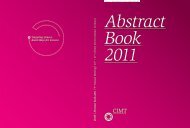Abstract Book 2010 - CIMT Annual Meeting
Abstract Book 2010 - CIMT Annual Meeting
Abstract Book 2010 - CIMT Annual Meeting
Create successful ePaper yourself
Turn your PDF publications into a flip-book with our unique Google optimized e-Paper software.
059 Bourquin | Cellular therapy<br />
Efficient eradication of subcutaneous but not of autochthonous<br />
gastric tumors by adoptive T cell transfer in a SV40 T antigen<br />
mouse model<br />
Carole Bourquin 1 , Philip von der Borch 1 , Christine Zoglmeier 1 , David Anz 1 , Nadja Sandholzer<br />
1 , Cornelia Wurzenberger 1 , Robert Kammerer 2,3 , Wolfgang Zimmermann 2 , Stefan Endres 1<br />
1 Center of Integrated Protein Science Munich (CIPS-M) and Division of Clinical Pharmacology,<br />
University Hospital of Munich, 80336 Munich, Germany<br />
2 Tumor Immunology Laboratory, LIFE-Center, Grosshadern, Ludwig-Maximilian University,<br />
Marchioninistr. 23, 81377 Munich, Germany<br />
3 Institute of Immunology, Friedrich-Loeffler-Institut, Paul-Ehrlich-Straße 28, 72076 Tuebingen, Germany<br />
In stomach cancer, there is a need for new thera-<br />
peutic strategies, in particular for the treatment of<br />
unresectable tumors and micrometastases. We investigated<br />
the efficacy of immunotherapy in an autochthonous<br />
model of gastric cancer, the CEA424-<br />
SV40 T antigen (TAg) transgenic mice. Treatment<br />
efficacy against both the autochthonous tumors<br />
and subcutaneous tumors induced by the derived<br />
cell line mGC3 were assessed. In wild-type mice,<br />
a dendritic cell vaccine loaded with irradiated<br />
tumor cells combined with CpG oligonucleotides<br />
induced efficient cytotoxic T cell and memory responses<br />
against mGC3 subcutaneous tumors. In<br />
contrast, neither subcutaneous nor autochthonous<br />
tumors responded to vaccination in CEA424-SV40<br />
TAg mice, indicating tolerance to the SV40 TAg.<br />
To examine whether tumors in these mice were<br />
principally accessible to immunotherapy, splenocytes<br />
from immune wild-type mice were adoptively<br />
transferred into CEA424-SV40 Tag transgenic mice.<br />
Treated mice showed complete regression of the<br />
subcutaneous tumors associated with intratumoral<br />
infiltrates of CD8 and CD4 T cells. In contrast,<br />
the autochthonous gastric tumors in the same mice<br />
were poorly infiltrated and did not regress.<br />
Thus, even in the presence of an active antitumoral<br />
T cell response, autochthonous gastric tumors<br />
do not respond to immunotherapy. This is the first<br />
comparison of the efficacy of adoptive T cell transfer<br />
between transplanted subcutaneous tumors<br />
and autochthonous tumors in the same animals.<br />
Our results suggest that in gastric cancer patients,<br />
even a strong antitumor T cell response will not<br />
efficiently penetrate the tumor in the absence of additional<br />
therapeutic strategies targeting the tumor<br />
microenvironment.<br />
103



